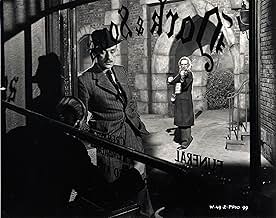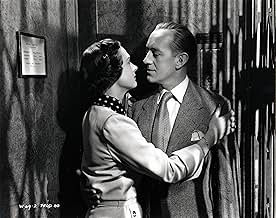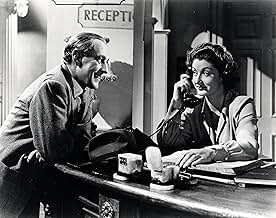IMDb RATING
7.3/10
2.3K
YOUR RATING
When a lonely, unappreciated farm-equipment salesman discovers he has only a few weeks to live, he withdraws his savings for a final holiday at a "posh" resort.When a lonely, unappreciated farm-equipment salesman discovers he has only a few weeks to live, he withdraws his savings for a final holiday at a "posh" resort.When a lonely, unappreciated farm-equipment salesman discovers he has only a few weeks to live, he withdraws his savings for a final holiday at a "posh" resort.
Grégoire Aslan
- Gambini
- (as Coco Aslan)
Eveline Kirkwood-Hackett
- Miss Hatfield
- (as Mme. Kirkwood-Hackett)
- Director
- Writers
- All cast & crew
- Production, box office & more at IMDbPro
Featured reviews
What makes a film good? In this case it's the writing that first draws you in. Writer and co-producer J.B.Priestly (The Old Dark House '32 ~ An Inspector Calls '54) has a way with words that compels the viewer to want to know more about his characters. With wit and a sense of mystery, he surrounds us with multi layered groups of people that are mostly drawn together by chance. In 'Last Holiday' the cruel hand of fate brings us face to face with ultimate irony.
It's filled with marvelous situations, at first upsetting, then wryly funny, leading to an unexpected ending that invites us to examine the way we not only relate to others, but how we treat them. Priestly is examining the bias that all too often accompanies class consciousness. The cast is exquisitely diverse, everyone from bit players to mains, deliver sterling performances under direction from Henry Cass (Glass Mountain '49). Welsh born Cinematographer: Ray Elton (Quartet '48) with his strong grounding in documentaries, brings a realistic look to the fine work of Scottish art director Duncan Sutherland (San Demetrio London '43 ~ The Human Monster '49).
I found the music score by Romanian born composer Francis Chargrin surprisingly melodic for a 50s film of this type. Its thoughtful main theme is equally likable as his later 'The Beachomber' in '54. You might also remember Chargrin for his 'Colditz Story' '55, and 'Grey Friars Bobby' '61. Those who enjoy the always professional performances of Alec Guinness will enjoy his generally dour role in this off-beat mini classic.
My viewing was hindered by Australian TV broadcaster Gem's, persistence in supering 'pop-up' adds for up-coming shows, and their ridiculous LARGE lolly 'Pink' station ID. At least this time they screened the full film after inadvertently leaving out a reel in an earlier screening! Sure wish this broadcaster would treat their viewers, and the films they run with far more respect!
It's filled with marvelous situations, at first upsetting, then wryly funny, leading to an unexpected ending that invites us to examine the way we not only relate to others, but how we treat them. Priestly is examining the bias that all too often accompanies class consciousness. The cast is exquisitely diverse, everyone from bit players to mains, deliver sterling performances under direction from Henry Cass (Glass Mountain '49). Welsh born Cinematographer: Ray Elton (Quartet '48) with his strong grounding in documentaries, brings a realistic look to the fine work of Scottish art director Duncan Sutherland (San Demetrio London '43 ~ The Human Monster '49).
I found the music score by Romanian born composer Francis Chargrin surprisingly melodic for a 50s film of this type. Its thoughtful main theme is equally likable as his later 'The Beachomber' in '54. You might also remember Chargrin for his 'Colditz Story' '55, and 'Grey Friars Bobby' '61. Those who enjoy the always professional performances of Alec Guinness will enjoy his generally dour role in this off-beat mini classic.
My viewing was hindered by Australian TV broadcaster Gem's, persistence in supering 'pop-up' adds for up-coming shows, and their ridiculous LARGE lolly 'Pink' station ID. At least this time they screened the full film after inadvertently leaving out a reel in an earlier screening! Sure wish this broadcaster would treat their viewers, and the films they run with far more respect!
The central character (Guiness) is "a modest unassuming salesman of agricultural implements" (Wikipedia). A respectable almost classless person whose unassuming manner, unglamorous job and modest salary have limited his social circle. For the first (and last) time circumstances allow him to spend freely and, for want of any other idea, stay a few weeks at a very upmarket seaside hotel. Its clientele have only one thing in common: either possessing wealth or using the opportunity to accumulate it. Some are rich and lack class, others have power and status as well as wealth. The Guinness character for the first time has an opportunity to network with important people.
Guinness in a way reprises his role in The Man in the White Suit - a thoroughly honest man innocent in the ways of the world whose modest manner and appearance belies his inventive genius. Yet is remarkably unchanged by success and continues to treat both high and low equally - and cause a surprising degree of unintended upset.
A good story with excellent cast, it is a less demanding part for the chameleon genius of Guinness. As usual with Priestley very well crafted story-telling. However the film dates from 1950 - 5 years after WW2 when people were looking to a better future and trying to put grief behind them. During WW2, Priestley had been the nation's uncle, providing not false comfort but a steadying presence putting the worlds events into a assimilable form for the average person. With the end of the war, the public's need for Priestley (much as their need for Churchill) ended. The film's sour end seems to have no point other than to say just when things are looking up and people at their most cheerful and optimistic, everything can be be dashed to the ground in an instant.
Guinness in a way reprises his role in The Man in the White Suit - a thoroughly honest man innocent in the ways of the world whose modest manner and appearance belies his inventive genius. Yet is remarkably unchanged by success and continues to treat both high and low equally - and cause a surprising degree of unintended upset.
A good story with excellent cast, it is a less demanding part for the chameleon genius of Guinness. As usual with Priestley very well crafted story-telling. However the film dates from 1950 - 5 years after WW2 when people were looking to a better future and trying to put grief behind them. During WW2, Priestley had been the nation's uncle, providing not false comfort but a steadying presence putting the worlds events into a assimilable form for the average person. With the end of the war, the public's need for Priestley (much as their need for Churchill) ended. The film's sour end seems to have no point other than to say just when things are looking up and people at their most cheerful and optimistic, everything can be be dashed to the ground in an instant.
I love this film and it's one of the few I've watched time and time again. It's a forgotten jewel and is infrequently mentioned. For me it has everything that was important of it's era. The social comment is mingled into an entertaining story. How the Health Service is expanding but people go hungry. An over worked Doctor making mistakes. George Bird being projected into a world that is not his own. The irony of riches coming his way when he thinks he has little time left. The Union's getting their grip on the country with strike action. How the upper classes view the lower and vice versa. How George Bird is now viewed as upper class because of his new setting. Post war money laundering. How war heroes can't find work. Love and jealousy. And the ironies - how he buys a dead man's clothes. How he swerves a car to avoid a dog that is due to be destroyed and turns into a road called 'Fallow End.' Then there is the acting. Sid James gives one of his great performance. His 1940's and 1950's work was superb. Sadly remembered for his Carry On performances more than the superb actor that he was. He just holds the scenes and in some cases is competing well with Guinness. For Guinness this is an early film. Ernest Thiesiger makes a great appearance along with many others including the delightful Kay Walsh. Esma Cannon's acting is well done - better than her later performances where 'silly' scripts let her down.
Please do see it if you can. It's a little gem.
Please do see it if you can. It's a little gem.
Unadventurous and safe agricultural equipment salesman George Bird (Alec Guinness) is diagnosed with Lampington's disease and told within a matter of time he will eventually painlessly slip into a coma before passing on. On the advice of his doctor as George has no close friends, is unmarried, and has no living family he liquidates his savings and insurance with his intention being to travel to the opulent Regal Hotel with his plans to spend every bit of his money and live more than he had up to that point.
Last Holiday is a 1950 comic drama directed by theater turned film director Henry Cass, and written by noted novelist, playwright, and political commentator J. B. Priestley. While a relatively small film in its day, retrospective analysis has been favorable to it, particularly in the performances of Alec Guinness as George Bird, Kay Walsh as Mrs. Poole, and Sid James as Joe Clarence with many divided on the film's "trick ending". Despite some very questionable decisions involving the ending, Last Holiday is a very poignant story that works on both a humorous level as well as a character based one.
The plot of Last Holiday is pretty thin at first glance as the movie is pretty much the setup with George Bird being a simple working-class man of strong character and principles who's been overly cautious throughout his life while neglecting things like the cultivation of friends and family. Guinness is undeniably the heart of this film as there is a humorous element to seeing George Bird throw caution to the wind with thoughts of the future and societal and cultural expectations placed to the wayside as Bird enters the opulent world of The Regal and his knowledge of how things work on a day-to-day basis serve to humble those of a higher class. In many ways you can see Bird as something of a precursor to other similar characters such as Peter Sellers' iconic Academy Award nominated performance as Chance the Gardener/Chauncey Gardener where the deceptive simplicity of the character is contrasted against the considerably emptier characters who pride themselves on status, prestige, and influence. Guinness is given no shortage of supporting players to play off against with particularly good exchanges coming from head housekeeper Mrs. Poole played by Kay Walsh with the two forming a low key romance that is very endearing, and Sid James is quite entertaining as Joe Clarence. Unfortunately the movie makes a massive mistake in its application of a twist ending that feels like it robs the story of emotional impact and it really seems like it ends on a downer note for no other reason than to catch the audience off guard. I'll admit it's a bold move in terms of an ending but not only does it needlessly turn tragic it leaves a feeling of "so what?" to everything we've seen.
There's a fantastic film for 95% of the running time thanks in no small way to the legendary Alec Guinness as George Bird who we really grow to care about as a likable everyman in an extraordinary set of circumstances. There's some on point social satire involving the contrast of Bird's working class principles against the "view from 20,000 feet" held by those of higher status at The Regal, but the ending they go with detracts from those solid points and takes a story that should be uplifting and turns it rather bitter and cruel.
Last Holiday is a 1950 comic drama directed by theater turned film director Henry Cass, and written by noted novelist, playwright, and political commentator J. B. Priestley. While a relatively small film in its day, retrospective analysis has been favorable to it, particularly in the performances of Alec Guinness as George Bird, Kay Walsh as Mrs. Poole, and Sid James as Joe Clarence with many divided on the film's "trick ending". Despite some very questionable decisions involving the ending, Last Holiday is a very poignant story that works on both a humorous level as well as a character based one.
The plot of Last Holiday is pretty thin at first glance as the movie is pretty much the setup with George Bird being a simple working-class man of strong character and principles who's been overly cautious throughout his life while neglecting things like the cultivation of friends and family. Guinness is undeniably the heart of this film as there is a humorous element to seeing George Bird throw caution to the wind with thoughts of the future and societal and cultural expectations placed to the wayside as Bird enters the opulent world of The Regal and his knowledge of how things work on a day-to-day basis serve to humble those of a higher class. In many ways you can see Bird as something of a precursor to other similar characters such as Peter Sellers' iconic Academy Award nominated performance as Chance the Gardener/Chauncey Gardener where the deceptive simplicity of the character is contrasted against the considerably emptier characters who pride themselves on status, prestige, and influence. Guinness is given no shortage of supporting players to play off against with particularly good exchanges coming from head housekeeper Mrs. Poole played by Kay Walsh with the two forming a low key romance that is very endearing, and Sid James is quite entertaining as Joe Clarence. Unfortunately the movie makes a massive mistake in its application of a twist ending that feels like it robs the story of emotional impact and it really seems like it ends on a downer note for no other reason than to catch the audience off guard. I'll admit it's a bold move in terms of an ending but not only does it needlessly turn tragic it leaves a feeling of "so what?" to everything we've seen.
There's a fantastic film for 95% of the running time thanks in no small way to the legendary Alec Guinness as George Bird who we really grow to care about as a likable everyman in an extraordinary set of circumstances. There's some on point social satire involving the contrast of Bird's working class principles against the "view from 20,000 feet" held by those of higher status at The Regal, but the ending they go with detracts from those solid points and takes a story that should be uplifting and turns it rather bitter and cruel.
Absent for years in Europe on both TV and Video, I finally managed to acquire this one on a VHS tape from the US. A man learns he has a short time to live and decides to make the most of it by living it up in a luxury hotel. His life suddenly becomes far more interesting, makes more money than ever before and luck generally smiles him in the face. I remember seeing it about Thirty years ago and wondered how a new viewing would affect me. There were one or two disappointments, I had a memory of the film being rather more romantic than it actually is ( nothing much actually happens on this side ) and parts of the film are rather 'chatty'. This said the overall story is quite original. The film captures that now long-lost atmosphere of a luxury 1950's English hotel in the bright sunshine presumably situated in Devon or Cornwall (as we see palm trees in the garden. There are many well-known actors and the script is quite original to say the least. Another of J.B. Priestley's stories 'An Inspector Calls' was also made on film and is actually very good, even better than 'Last Holiday'. Nevertheless, the haunting theme music (solo fiddle) and thedécors are A1. Picture and sound quality are very good for the time (1950) and I am surprised that the film is not readily available on VHS and DVD everywhere! Of course, Alec Guinness was a great actor and his performance here is totally up to standard. If the romantic side of it all had been pushed just a little further the film would have been perfect for me ! The ending of the film is the Wickedest and most unexpected in the history of cinema !
Did you know
- TriviaThe film includes cast members who cropped up in various Alec Guinness films. Amongst them are Sidney James, Ernest Thesiger and Kay Walsh.
- GoofsBird states that he made about 9 Pounds a week. This is about 470 Pounds per annum. When his manager is trying to get him to stay he first offers to raise his salary to 400 Pounds p.a.
- Quotes
George Bird: How do you keep smiling with a stiff upper lip?
- ConnectionsRemade as Last Holiday (2006)
- How long is Last Holiday?Powered by Alexa
Details
- Release date
- Country of origin
- Language
- Also known as
- Ferien wie noch nie
- Filming locations
- Luton, Bedfordshire, England, UK(Shopping parade and Doctor's office)
- Production company
- See more company credits at IMDbPro
- Runtime
- 1h 28m(88 min)
- Color
- Aspect ratio
- 1.33 : 1
Contribute to this page
Suggest an edit or add missing content



































